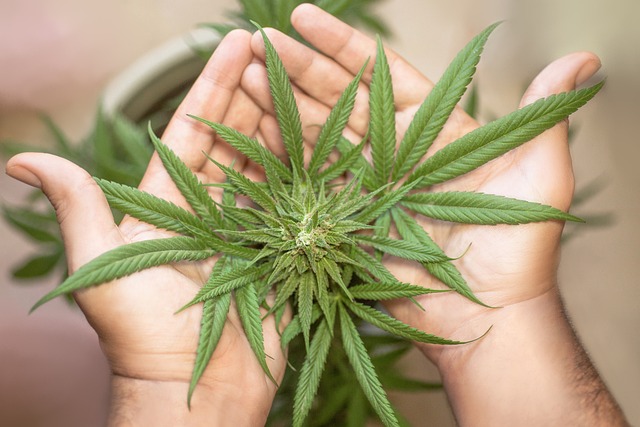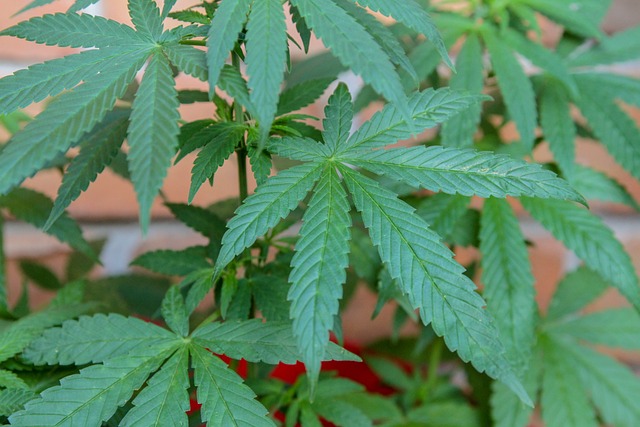Arizona's cannabis landscape has been reshaped by the emergence of THCA (tetrahydrocannabinolic acid), a non-psychoactive cannabinoid that has become increasingly available and popular post-Proposition 207, which legalized recreational cannabis in November 2020. THCA is different from its psychoactive counterpart THC, offering therapeutic benefits without the 'high' sensation. It's present in raw cannabis plants and is gaining attention for its potential health advantages, including anti-inflammatory and neuroprotective properties. In Arizona, THCA falls under the same legal umbrella as hemp-derived products, provided it contains less than 0.3% Delta-9 THC on a dry weight basis, as stipulated by the 2018 Farm Bill. Users should navigate this space with care, understanding that THCA is legal in Arizona but requires responsible consumption to avoid adverse effects like dry mouth and eyes, dizziness, anxiety, or paranoia, especially at higher doses. Consumers are advised to start with low doses, purchase from reputable sources, and consult healthcare professionals, particularly if they are sensitive to cannabinoids or are taking other medications. As research continues to uncover more about THCA's benefits and risks within Arizona's regulated framework, staying informed is key for anyone considering its use as part of their wellness routine.
Exploring the emergence of THCA flower within Arizona’s marketplace, this article delves into the nuanced differences between THCA and its psychoactive counterpart, Delta-9 THC. As THCA gains recognition for its potential therapeutic properties and legal status in Arizona becomes clearer, it’s crucial to understand the side effects associated with its use. From assessing benefits against risks to navigating safe consumption levels, this piece provides a comprehensive overview of THCA flower, its legal standing, and the entourage effect it produces when combined with other cannabis compounds. Real-life user experiences and medical research findings are examined to inform best practices and address any concerns regarding side effects. With a focus on cultivation quality control and the intersection of state and federal laws, this article aims to equip readers with the knowledge necessary to make informed decisions about THCA flower consumption in Arizona.
- THCA Flower and Its Emergence in the Arizona Marketplace
- Understanding Delta-9 THC vs. THCA: The Science Behind Their Effects
- Legal Status of THCA Flower in Arizona: A Comprehensive Overview
- Potential Side Effects of THCA Flower: What Users Should Know
- Assessing the Therapeutic Benefits and Risks of THCA Consumption
THCA Flower and Its Emergence in the Arizona Marketplace

In recent times, THCA (Tetrahydrocannabinolic Acid) Flower has gained traction within the Arizona marketplace, as its legal status has paved the way for its availability to consumers. The emergence of THCA Flower in Arizona is a testament to the evolving landscape of cannabis legislation and consumer preferences. Unlike its psychoactive counterpart THC (Tetrahydrocannabinol), THCA exists in its non-psychoactive raw form and is prized for its potential therapeutic properties. As such, it has become a subject of interest among those seeking the benefits of cannabinoids without the intoxicating effects. The legalization of recreational marijuana in Arizona, with the passing of Proposition 207 in November 2020, has set the stage for a burgeoning market for THCA Flower. Retailers across the state have been quick to adapt, offering this new product to a growing base of consumers who are keen to explore its potential effects and uses. The rise of THCA Flower in Arizona is not just a reflection of legislative change but also indicative of the increasing sophistication of consumers who are becoming more aware of the various cannabinoids available in the market. As this trend continues, it remains to be seen how THCA Flower will further integrate into the lifestyle and wellness routines of Arizona residents.
Understanding Delta-9 THC vs. THCA: The Science Behind Their Effects

Delta-9 tetrahydrocannabinol (THC) and tetrahydrocannabinolic acid A (THCA) are two distinct compounds found in the cannabis plant, each with unique effects and legal statuses. THC is the primary psychoactive component of cannabis, responsible for the ‘high’ that users experience. It is well-studied for its medicinal properties, including pain relief, anti-nausea effects, and as an appetite stimulant. In contrast, THCA is non-psychoactive and exists in raw or live cannabis plants; it becomes psychoactive when heated or decarboxylated.
In Arizona, where the recreational use of cannabis has been legalized under Proposition 207, Delta-9 THC products are regulated and taxed by the state. However, THCA, particularly in its raw form, is considered legal as long as it contains less than 0.3% Delta-9 THC on a dry weight basis, aligning with federal guidelines under the 2018 Farm Bill. This distinction is crucial for consumers and manufacturers who are interested in the therapeutic properties attributed to THCA without the psychoactive effects associated with THC. Scientific research suggests that THCA may offer benefits such as neuroprotection, anti-inflammatory effects, and potential cancer cell growth inhibition. The science behind their effects lies in the interaction with the body’s endocannabinoid system, where both compounds can influence various physiological processes, offering different therapeutic applications. Understanding the nuances between THC and THCA is essential for consumers to make informed decisions based on their needs and the legal landscape of their residence, such as Arizona.
Legal Status of THCA Flower in Arizona: A Comprehensive Overview

THCA, or Tetrahydrocannabinolic Acid, is a non-psychoactive cannabinoid found in the Cannabis sativa plant that can convert into THC when exposed to heat or light. As of my knowledge cutoff in early 2023, the legal status of THCA flower in Arizona is nuanced and subject to the state’s evolving cannabis laws. Under the Arizona Medical Marijuana Act (AMMA), patients with a valid medical marijuana card can possess and use products that contain THC, including smokable flower forms. However, the legislation explicitly allows for the use of “usable marijuana” which technically refers to the dried flowers of the cannabis plant. This has led to some confusion regarding whether raw or uncured flowers containing high levels of THCA are legal under the AMMA.
Arizona’s Proposition 207, which legalized recreational cannabis for adult use, took effect on November 30, 2020. This initiative allows adults 21 and older to possess, use, and transport up to one ounce of cannabis, which includes THCA flower if it is sold by a licensed dispensary. It’s important for consumers to purchase from licensed retailers to ensure compliance with state laws, as these establishments test their products for potency and contaminants. Additionally, the Arizona Department of Health Services regulates the cultivation, processing, and sale of cannabis, including THCA flower, ensuring that it is legally available for purchase to those who meet the age requirement. Consumers should stay informed on any updates to state laws, as the legal landscape of cannabis products, including THCA, can change with new legislation or regulatory guidance.
Potential Side Effects of THCA Flower: What Users Should Know

Users considering the use of THCA flower, particularly in areas where it is legal such as Arizona, should be well-informed about its potential side effects. THCA, or tetrahydrocannabinolic acid, is a non-psychoactive cannabinoid found in raw cannabis plants and is precursor to THC, the psychoactive component of cannabis. While often touted for its therapeutic benefits, like any substance, it can elicit side effects in some individuals. Common reported side effects include dry mouth and dry eyes, which are typically mild and temporary. However, users may also experience dizziness, anxiety, or paranoia, particularly at higher doses or in those sensitive to cannabinoids. It’s crucial for users to start with a low dose to gauge their individual reaction and to avoid combining THCA with other substances that may amplify its effects. Additionally, as THCA is legal in Arizona under certain conditions, adherence to state regulations and dosing guidelines is essential to ensure a safe experience. Users should also be cautious about the source of their THCA flower, ensuring it comes from a reputable provider to avoid any contaminants or adulterants that could exacerbate side effects or cause harm. As with any substance, individual responses can vary significantly, and personal tolerance levels differ, making it imperative for users to approach THCA flower with careful consideration and responsible use.
Assessing the Therapeutic Benefits and Risks of THCA Consumption

THCA, or tetrahydrocannabinolic acid, is a non-psychoactive precursor to THC found in raw cannabis plants and has garnered attention for its potential therapeutic benefits. In Arizona, where the use of medical marijuana is legal under specific conditions, THCA’s status aligns with these regulations, allowing for exploration into its effects. Research indicates that THCA may offer anti-inflammatory, analgesic, and neuroprotective properties, suggesting it could be beneficial in treating a variety of conditions such as pain, inflammation, and neurological disorders. However, like any substance, it’s not without its risks. Consumption of THCA-rich products should be approached with caution, especially given individual differences in response to cannabinoids. It’s important for consumers to understand the legal context and consult healthcare professionals before incorporating THCA into their wellness regimen. As with any therapeutic substance, potential side effects can include gastrointestinal discomfort, psychoactive effects if the THCA is not properly decarboxylated, and interactions with other medications. The ongoing research into THCA’s effects continues to shed light on its potential role in a balanced wellness approach, particularly within the legal framework established in Arizona. Users should be informed about both the therapeutic benefits and the possible risks associated with THCA consumption to make educated decisions about their health.
In recent times, the emergence of THCA flower in the Arizona marketplace has sparked considerable interest among consumers intrigued by its potential effects and therapeutic benefits. As detailed throughout this article, understanding the distinction between Delta-9 THC and THCA is crucial for users to make informed decisions about their consumption choices. The legal status of THCA flower in Arizona has been clarified, with a comprehensive overview that underscores its distinct regulatory standing compared to other cannabinoids. It is imperative for users to be aware of the potential side effects associated with THCA flower, as highlighted in our discussion on its effects and risks. Ultimately, while THCA flower is legal in Arizona under certain conditions, it is essential to approach its use with caution, recognizing both its therapeutic potential and the need for further research to fully assess its implications. Users are advised to consult with healthcare professionals before incorporating THCA flower into their wellness routines to ensure safe and responsible consumption practices.
